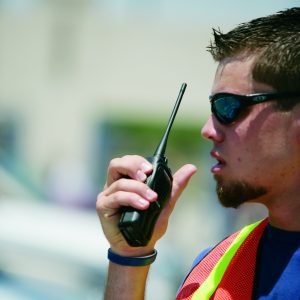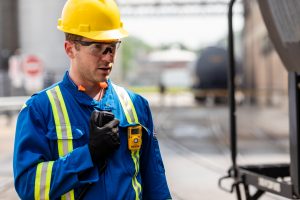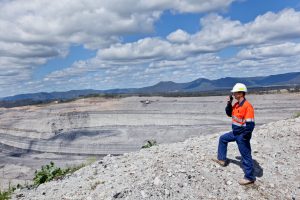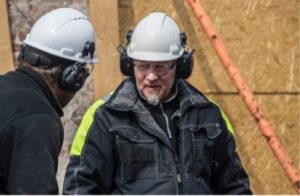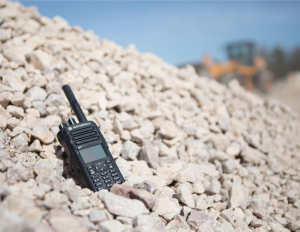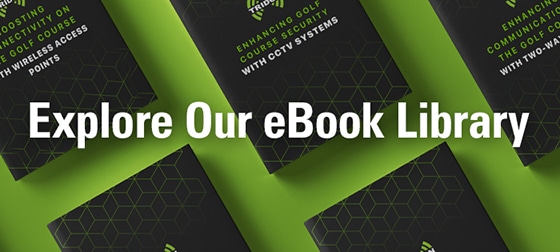Looking for rugged, durable, VHF radio equipment?
Contact Us, and we’ll get you set up.
Albertans work in the outdoors, year-round. Winter drilling projects run at full tilt in the near Athabasca and Fort McMurray in the blistering cold. Come the summer, road crews and construction crews are taking on repairs, upgrades and new projects in Edmonton, Calgary, and all over the rest of the province.
Two-way radio equipment is often the best way to keep these teams connected, organized, and safe, especially if they’re working across a wide area. That said, they’ll only do this if your team is using the right radio equipment, with the right accessories and infrastructure.
So, let this article serve as a checklist of things to remember, or at least consider when buying or renting two-way radio equipment for outdoor work.
Consider Using VHF Radios
Generally speaking, VHF radio equipment will support your outdoor team better than UHF. Short for Very High Frequency, VHF radios are known to have a longer transmit range than UHF. Like all radio equipment, VHF radios transmit based on line-of-sight, meaning any physical object in the signal’s path could serve as an obstacle to your signal. This may not be a problem if you’re working in a flat area, but if there are hills, valleys, mountains or buildings in the way, it can interfere with your signal and distort your message.
All told, the benefits of range outweigh these challenges time and time again. That’s why you see outdoor crews using them. It’s also why you see VHF mobile radios (sometimes called truck radios) installed in tractor-trailers and work trucks. The range of VHF radios allows for easy communication with dispatchers and fellow drives.
You May Need Repeaters
Like we mentioned, the range of VHF radio equipment makes it the preferred choice for outdoor, long-range communication. But if there is any interruption or barrier to the signal’s line of sight, your transmission could be distorted to the point of being unintelligible. For example, if you’re working in the Oil Sands, and new mountains of sand and gravel appear overnight, they could actually interfere with your transmission. That’s why we recommend our clients use repeaters.
A repeater is basically a signal booster for two-way radios. It receives weaker signals from transmitting radios, boosts the power, and retransmits the signal (hence the name, repeater) to the intended recipient.
So, if you’re stuck behind that newly made mountain of gravel, a repeater can make the difference between your team getting a distorted signal or crystal-clear audio. The repeater will most likely be installed on a communication tower, well above any obstruction or barrier. It’ll pick up your signal and retransmit it to your team members. Because the repeater has a clear line of sight to both of you, the obstruction (a mountain of gravel in this case) won’t be a problem.
Repeater systems are just as beneficial to long-range communications. If you’re a dispatcher, trying to reach a courier or bus driver on the other side of Edmonton, a repeater system will make a huge difference. If you’re working in the Oil Sands, mountains of gravel won’t be the only problem; distance will be a factor, too. Having repeaters installed will go a long way towards connecting your entire team.
Accessories Will Be Worth the Investment
If your team is working in the outdoors, it’s a safe bet that they’re working with their hands. If that’s the case, they are at their most productive when they can keep both hands and their full attention on the job. Two-way radio accessories help them do that.
Speaker mics make using two-way radios much easier. Instead of stopping work to reach for a radio to transmit or respond to a message, they can use the microphone clipped to their shoulder. It may not sound like much, but the opportunity to continue working while communicating is a big benefit to productivity. Having the speaker mic clipped to your shoulder also makes it easier to hear messages the first time.
The same can be said for two-way radio headsets. With the PTT (push-to-talk) button installed on the headphone, your team can respond to messages without having to stop what their doing. In addition to providing crystal clear audio, two-way radio headsets also provide hearing protection. If your team works in a high-noise environment, like construction sites, hearing protection is an absolute must.
Even something as simple as a radio holster can make using two-way radios easier for your staff. They provide protection for your radio, blocking out dirt, dust, and water while giving your team an easy place to store the radio when they’re not using it.
There is a range of accessories that will help your team and knowing which are best requires that you consider your work environment as much as your objectives and budget. Take a look at our accessories catalog if you’re looking for options, or Contact Us with any questions.
Digital Is Your Best Option
If you’re using two-way radios already, you’ve heard about digital. If you’re still using analog, your provider has probably talked to you about making the transition. There are a few really good reasons why.
Range
This is a key priority for anyone working outdoors. With analog two-way radios, the signal deteriorates as you approach the boundaries of the coverage area. This may lead to team members, working on opposite sides of a coverage area, having to repeat the message multiple times before it can be clearly understood.
Digital radios don’t have this problem. Because of the way the signal is transmitted, digital radios can maintain signal quality throughout the coverage area. That means workers get the same clear message, even when far apart.
Noise Cancellation
The background noise of machines and running engines will get transmitted, along with your message, when you use an analog two-way radio. When this happens, your team members may have to repeat the message multiple times so it can be understood or relocate to a quieter area. Both represent an unnecessary break in productivity. And, if the message is urgent, they represent potential safety risks.
Digital radios are capable of focusing on the speaker’s voice and can filter out much of that ambient noise. The end result is loud, clear audio that can be understood the first time. This saves your team a lot of frustration.
Waterproofing and Dust-Proofing
Analog or digital, if your team is working outdoors – on construction sites, mine sites, you name it – your radio equipment will get dirty. After a week in the field, dirt, gravel, mud, and dust will be all over the units in your fleet.
A radio’s Ingress Protection rating (IP rating) is a measure of how well protected it is against water and debris (dust, gravel, etc.) entering the housing and damaging the internal components. The higher the IP rating, the better the waterproofing and dust-proofing.
It may be tempting to go with radios that have a lower IP rating because of the up-front cost savings. Just be aware that you may end up spending more than you planned on repairs and replacement equipment. Add to that the frustration of radios failing you in the field. While they may cost more, getting radios with the right IP ratings for your job site will safeguard your investment in the long run.
Getting Started
Even with all these considerations in mind, you’ll still be left with a range of options when it comes to radio equipment. So, if you want help finding the option that’s right for your project, Contact Us. Our Account Managers have years of experience equipping clients with tough, rugged radio equipment and systems. We’re here to help.
Tridon is a full solution Telecom Systems Integrator with CSA certification and licensed by APEGA. Our Engineering, Service and Tower Divisions collaborate with customers to build engineered solutions including communications systems design, tower inspections and co-location, wireless broadband, fiber optic cabling, site security and two-way radio communication.

